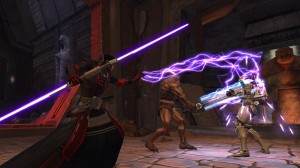SW:Tor is still a good ways off. We don’t even have a definite launch date yet, but that doesn’t stop people from laying plans for what they and their friends should do once it launches. But this excitement is full of potential traps that guild leaders and officers should be aware of to help keep group cohesion going into a very dynamic period of play after launch. This post was inspired by a revelation in the Q&A of the Studio Insider Friday Update on 12-17-2010 in which Dallas Dickinson, Director of Production for BioWare Austin, answered the following question:
Will there be different server types, as in PvE servers and PvP servers? (asked by Fruskov)
There will be several different types of server, including PvP servers and PvE servers.
Notice he says there will be several different types of severs INCLUDING PvP and PvE. That suggests that PvP and PvE are just two traits of server creation. I assume they will have time zone suggested servers so populations will roughly know when prime time will be, but I think there will also be Role Play servers, and probably the Role Play servers will come in a PvP and PvE variety. There may be additional traits for server rules that I’m not thinking of, but assuming the server list is populated with PvP, PvE, RP-PvP, and RP-PvE servers for a variety of time zones players have plenty of options for their game world. And that is great for players, but may not be as good for guilds who are coming from other games into SW:ToR. 
A brief bit of history is in order to better explain this. The Church of Alvis was created in Star Wars: Galaxies in August of 2003. Now the thing to remember about SWG is that it had no official server rules. Every server was the same. Sure some servers took it upon themselves to become “The Unofficial RP server” or the “Unofficial French Server”, but in every server there was at launch some fledgling RP community, a PvP scene probably fighting over Anchorhead, and plenty of PvE players doing their thing. So you ended up with all kinds of players interacting and it led to some great moments, but you also saw players get frustrated that others didn’t take their aspect of game play as seriously as others. A notable Imperial Guild Leader on our server said that because others didn’t role play right, citing the Church of Alvis, his vision of Star Wars (movies and all) had been ruined. That is unfortunate, and probably avoidable by breaking the communities among the RP/ no-RP and PvE/PvP divides like World of Warcraft has done.
The problem that this presents to existing guilds is that their pool of players have to come kind of agreement about what aspect of game play is most important to them as a group. Is you guild significantly interested in Role Play or are they fine seeing people with names like Look Skywalkar and Darf Vaydar walking around talking about how the local sports franchise is doing this year. Similarly you have to decide as a group that you want world PvP at any time versus choosing to PvP under timing that you control as you’d see on a PvE server. Besides these questions, you also have to decide what faction you will run as.
The default for the kind of server for most people will be a non-RP PvE server. Heavy Role Players like PAX Imperius, who formed as a role play guild for Imperials, obviously know their members want no Loook Skywalkars and Darf Vaydars debating the merits of the west coast offense in the SEC. Likewise guilds like Veers Elite know that they don’t care about Loooks and Darfs and only want the chance at lots of PvP. Guild leadership has to be responsive to their members. That said it will be tough because any decision you make might result in a member leaving for another gaming opportunity. If Alvis were to go Sith I know that some of our members might go along with it even though they strongly prefer Republic, and I know some of our members have no interest in one faction or the other making the faction decision a deal/no deal on running with Alvis in SW:ToR. It is important for the guild as a whole to try very hard to come to a consensus on who they are so they can land on the right kind of server with the right faction.
Even if you get the right server and faction for all of your members you will still have some potential problems once the game launches. Every player is different. Some like to leisurely level seeing all of the sites and enjoying the walk. Some will race to maximum level and be chomping at the bit for “end game content”. Some players have more time to play than others who juggle gaming with other commitments in their life. Some like to roll and play around on alts while some only play one character all the time. This shouldn’t present a problem unless people have different expectations of what the guild is suppose to be doing. I’ve been playing WoW away from Alvis since 2005 with some other friends. I’ve been in a few different guilds and on a few different types of servers, and through each expansion that comes out I see the same pattern emerge. A few dedicated players race to max level, get raid ready then complain others are taking to long. The stragglers complain that they never get to raid just because they didn’t get to max level quickly. Arguments break out invoking cliche “core guild values” and “principles of fairness”, and some people leave. So to give these groups names, let’s call the quick leveling raiding types “Power Gamers” and the stragglers “Casual Gamers”. And while I’ll use raiding as an example I’m sure similar things happen in PvP guilds where people have to sit out of events because they aren’t ready, or frustration in RP guilds that Bob isn’t writing up a novel of back story like Jack did.
So all guild leaders and guild officers interested in keeping the group together should know going in that there will pretty quickly be a gap in progress (be it level, crew skills, RP stories, PvP skill whatever) that will start to frustrate players at some point. The key thing to remember is that players need to heard, and reminded that this gap is most likely a temporary one. After time the stragglers will catch up. One big suggestion is to set “deadlines” for inclusion. It has to be reasonable for a casual player, but not so far off from now that the hardcore player feels like she will never get to do the activities they really want to do. For example let’s say that your guild has a sizable group of people who are interested in raiding. The hardcore people may be ready in a month, the casuals will start being ready in two months if they are reasonably focused. Make a deadline of we walk into the raid in 2 months. It shows the hardcore people that you want to get going, but also lets casuals know that others are depending on them to get ready to tackle the content. Broad reasonable guild goals are a good way to give people purpose not only for themselves, but for helping other guildmates. If as a hardcore player, I know that a raid encounter requires players to be geared to a certain level (using the WoW model since we don’t know too much about SW:ToR endgame) then I am more willing to jump on guild members to join me on content to get that gear. Same thing with leveling professions, if I know that we need someone to level up their crew skills so we can have something as a guild, I will funnel materials and resources their way to assist. The casual player also knows that others are depending on them to join them for the activity and would be more focused in their game time to get to the group’s expectation spending less time taking screen shots of the flowers of Alderaan (ooh this blue one was really pretty!). I don’t want to say the players don’t have a right to dedicate their playtime towards virtual floral photography, but it is unreasonable for those players to think that they can dedicate time to that and be able to engage in activities that require lots of preparation and focus to be part of a group effort.
It ultimately boils down for guild leadership to listen to what their members want, and making sure that you provide a vision of where the guild is going, and how to get there. It won’t always be easy, but if you can have a generally accepted goal, and players are on the same page on how as a group you are getting towards that goal, it should work out well.

